Top 6 Decentralized Prediction Markets

Summary: Decentralized prediction markets allow traders to speculate on future events using crypto collateral, transparent settlement, and market-driven pricing, instead of relying on traditional bookmaking systems.
Currently, prediction market options span politics, sports, economics, culture, and crypto trends, with billions in contracts traded. Below are the six leading prediction protocols in 2025:
- Polymarket - Largest Decentralized Prediction Platform
- Myriad - Most Promising Platform With Points Program
- Drift BET - Solana-Native Multi-Collateral Prediction Market
- Kalshi - First CFTC-Regulated Event Contract Exchange
- Robinhood - Simplest Retail Gateway To Event Trading
- Crypto.com - Leading US CEX With Event Contracts
Polymarket is the leading decentralized prediction market, built on Polygon. With over $18.4 billion in trading volume, it offers unmatched liquidity and reliability in the space.
Available Betting Markets
Politics, Sports, Pop Culture, Science, Business & more
Supported Countries
Available Globally with No KYC or ID Requirements
Investors
Backed by Peter Thiel, Founders Fund, Vitalik Buterin & others
Best Crypto Prediction Markets in 2025
We conducted an in-depth review of today’s leading prediction markets by personally testing each platform, evaluating liquidity, fee structures, collateral options, and regulatory frameworks.
While the domain is still dominated by Polymarket, several decentralized competitors are emerging with unique token models and governance approaches. At the same time, we included key centralized platforms that enable crypto deposits, bridging traditional regulation with digital asset accessibility.
We highlight the most important things in the table below:
1. Polymarket - Largest Decentralized Prediction Platform
Polymarket is the largest decentralized prediction market, accounting for nearly 87% of the industry’s total trading volume. The platform lets users trade event outcome shares denominated in USDC on Polygon, with prices between $0.00 and $1.00 reflecting real-time probabilities.
Unlike sportsbooks, Polymarket operates on a peer-to-peer order book where users trade directly against each other, not the house. This structure eliminates trading fees entirely and allows shares to be sold anytime before resolution, offering flexibility for hedging or locking in profits.
Based on our research, multiple studies show that Polymarket’s prediction markets outperform traditional polling in accuracy. By aggregating trader incentives, news flow, and expert analysis, the platform provides odds that serve as a more reliable indicator of future outcomes than polls.
Polymarket Highlights:
- Chain: Polygon network with bridged Ethereum support.
- Deposit Methods: USDC via Coinbase, MoonPay, wallets.
- Fees: No deposit, withdrawal, or trading fees.
- Trading Model: Peer-to-peer order book, not against house.
- Fiat Access: Visa/Mastercard via MoonPay integration.
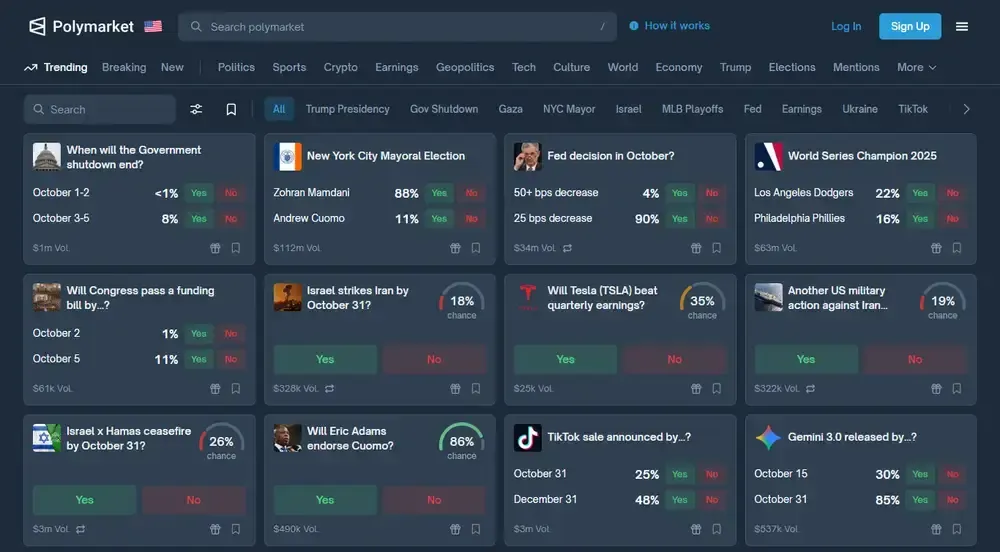
2. Myriad - Most Promising Platform With Points Program
Myriad runs on the Abstract blockchain, blending prediction markets with a points system that supports both free-to-play forecasting and USDC-backed markets. Users begin with 1,000 Points, earn more through quests and contests, and move them on-chain from “Limbo” to access full market participation.
Engagement is fueled by community contests, seasonal events like “Uptober” and “Abstract August,” and the “Share to Earn” program. Referrers receive 1% of referral trading volume in USDC plus weekly bonus Points, directly linking social growth to market activity.
Leaderboards factor in trading volume, referrals, quests, and realized PnL, with multipliers for active USDC traders. This structure rewards both casual predictors and high-volume players, positioning Myriad as a community-driven alternative to traditional markets.
Myriad Highlights:
- Chain: Built on Abstract blockchain.
- Market Assets: Points + USDC trading support.
- Deposit Methods: Abstract Global Wallet, MetaMask, email/social login.
- Referral Rewards: 1% USDC volume + 100 Points per $1 traded.
- Leaderboard System: $ score, Ref score, PTS score with multipliers.
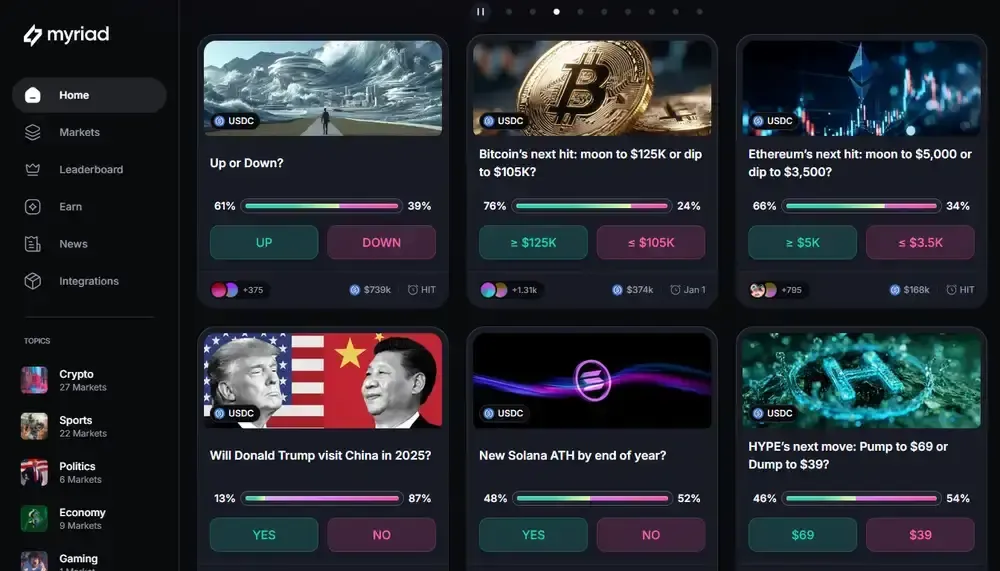
3. Drift BET - Solana-Native Multi-Collateral Prediction Market
Drift’s B.E.T. is a capital-efficient prediction market on Solana, supporting 30+ collateral tokens beyond USDC. Users earn interest on idle collateral, extend margin on non-USDC assets with zero interest until losses are realized, and face no liquidation risk when trading solely with USDC.
Markets are binary (YES/NO) but include limit and stop orders, keeping the system familiar for experienced derivatives traders. Margin is based on “worst case liability,” so open or offsetting positions don’t need extra collateral, freeing more capital without adding unnecessary risk.
Resolutions are managed by Drift’s governance council, which updates the oracle to finalize outcomes. Settlement occurs after expiry, backed by insurance funds that cover shortfalls. In rare cases, losses may be socialized, creating a transparent and resilient framework for managing platform risk.
Drift BET Highlights:
- Chain: Solana blockchain.
- Collateral: 30+ tokens accepted, not just USDC.
- Order Types: Full support for limit, stop, reduce-only trades.
- Fees: Taker 0.035%-0.020% | Maker rebates up to -0.0033%.
- Staking Benefits: Up to-40% taker fee discount, +40% maker rebate.
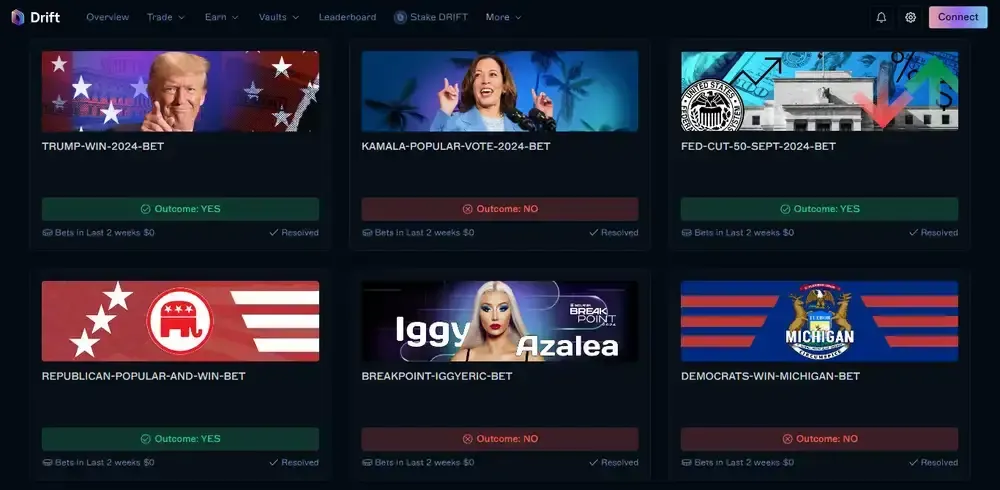
4. Kalshi - First CFTC-Regulated Event Contract Exchange
Kalshi is the first federally regulated prediction exchange in the US, operating under CFTC approval as a Designated Contract Market. Its centralized structure ensures user protections through government oversight, transparent settlement procedures, and standardized reporting aligned with existing financial markets.
The exchange introduces “event contracts,” a regulated asset class where outcomes on events resolve to either $0 or $1. Traders speculate on topics such as Federal Reserve rate decisions, extreme weather events, or entertainment milestones, treating contracts much like binary futures instruments.
Deposits are available through debit, bank transfers, wires, or crypto via Zero Hash, with limits reaching $500,000 per transaction. Kalshi charges fees on expected earnings rather than flat trade costs, while special event markets may feature adjusted maker or taker pricing.
Kalshi Highlights:
- Chain: Off-chain, centralized.
- Regulation: CFTC Designated Contract Market (DCM) status.
- Deposit Methods: Bank transfer, debit card, wire, crypto via Zero Hash.
- Fees: Up to 5% of profit, capped $0.85 per contract.
- Tax Compliance: 1099-INT, 1099-MISC, 1099-B issued for qualifying users.
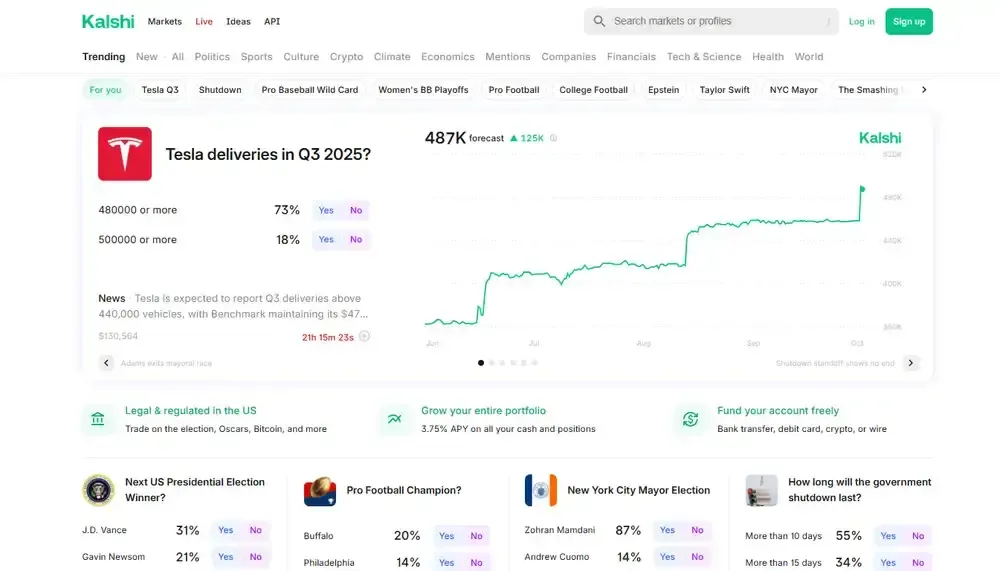
5. Robinhood - Simplest Retail Gateway To Event Trading
Robinhood introduced event contracts in 2025 through its derivatives arm, positioning them as regulated prediction markets accessible within its brokerage app. Unlike decentralized alternatives, users must hold a Robinhood Derivatives account, with eligibility tied to margin investing or Level 2-3 options approval.
Each contract is priced between $0.01 and $0.99, resolving to $1 for correct outcomes and $0 otherwise at settlement. Traders can hold until expiry or exit early by taking the opposite side, with all orders executed as immediate-or-cancel limit orders.
Robinhood disclosed that it has already facilitated over 4 billion event contracts, including 2 billion in Q3 2025 alone. At the same time, it is in active discussions with the UK’s FCA to expand into European markets, where prediction contracts are often treated under gambling regulation rather than derivatives law.
Robinhood Event Contracts Highlights:
- Chain: Off-chain, broker-integrated prediction contracts via Robinhood Derivatives.
- Regulation: Offered through CFTC-regulated partner exchanges (e.g., Kalshi, ForecastEx).
- Deposit Methods: Bank, debit card, wire; funded through Robinhood investing account.
- Order Types: Immediate-or-cancel limit orders only; no stop/advanced orders.
- Fees: $0.01 commission + $0.01 exchange fee or $0.01 embedded spread.
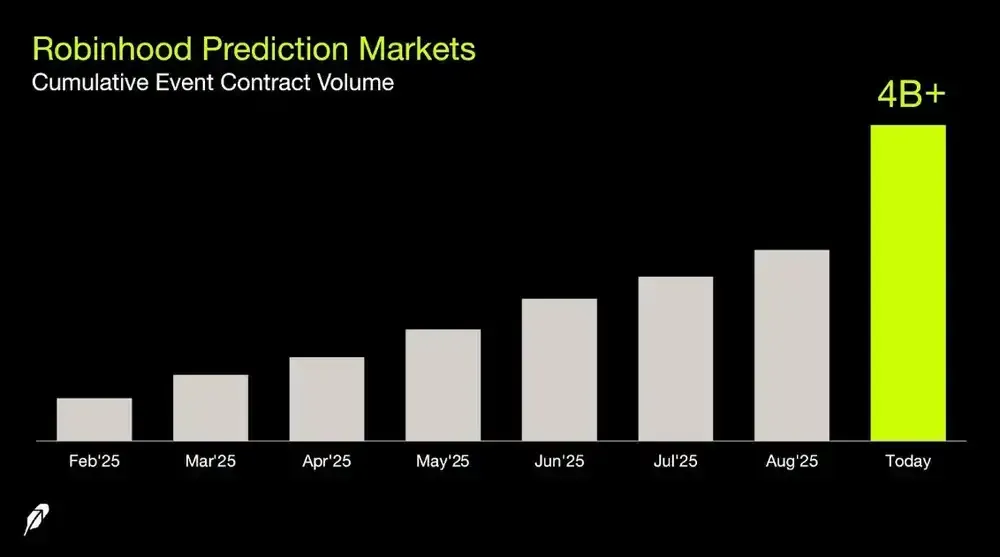
6. Crypto.com - Leading US CEX With Event Contracts
Crypto.com launched Prediction Trading in the US through its CFTC-regulated subsidiary, Crypto.com Derivatives North America (CDNA). Users can speculate on political, economic, or cultural events via $1 or $10 fully collateralized contracts that pay out a fixed amount at settlement.
Each contract has predefined limits: 2.5 million positions per event for $1 contracts and 250,000 positions for $10 contracts. Orders are submitted as market orders with protection and immediate-or-cancel execution, supported by slippage tolerance of $0.05 per contract.
Fees are transparent: opening or closing a $1 contract costs $0.02 per side, while a $10 contract costs $0.10 exchange + $0.10 technology fee. In-the-money $1 contracts settle fee-free, while $10 contracts only incur a $0.10 exchange fee at resolution.
Crypto.com Prediction Trading Highlights:
- Chain: Off-chain, CFTC-regulated prediction contracts via CDNA.
- Settlement: Fixed $1 or $10 payout per winning contract.
- Position Limits: 2.5M contracts ($1 value); 250K contracts ($10 value).
- Funding Options: USD cash via ACH, wire, or crypto-to-USD conversion (350+ supported tokens).
- Availability: United States only, subject to CFTC oversight.
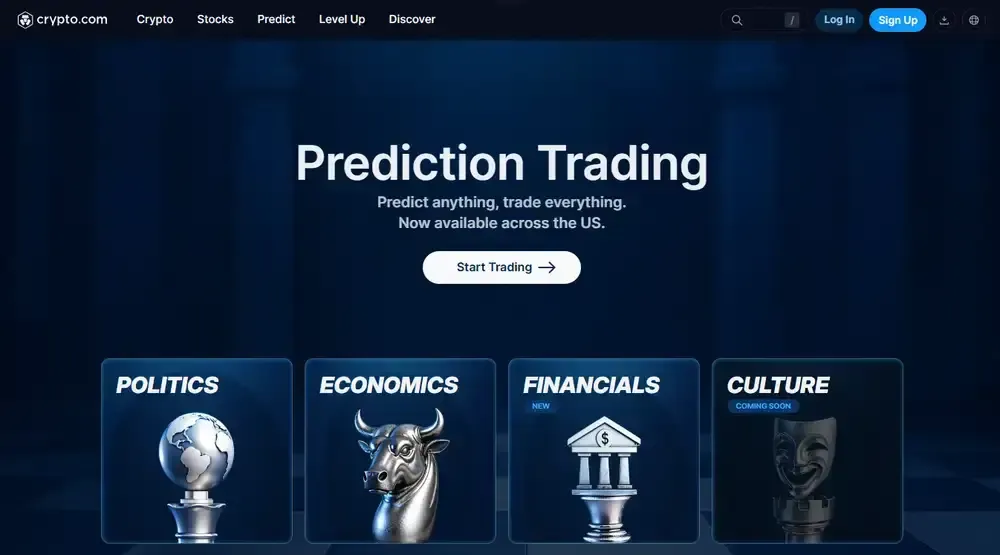
What Is a Decentralized Prediction Market?
A decentralized prediction market is a platform where people use cryptocurrencies to trade contracts on potential future outcomes. Each contract settles at $1 if correct and $0 if not, so the trading price reflects the market’s collective probability, determined entirely by supply and demand rather than a bookmaker.
The earliest major attempt was Augur, launched in 2015 on Ethereum, which proved the idea but suffered from high fees and low liquidity. These challenges pushed newer platforms to adopt faster blockchains, stablecoin collateral such as USDC, and simpler designs that feel familiar to mainstream traders.
By 2024, the concept reached scale when Polymarket processed billions in contracts during the US election season. Elon Musk publicly highlighted Polymarket’s odds favoring Donald Trump, who ultimately won the presidency, a moment that validated these markets as faster and more accurate than traditional polling.
How Do Prediction Markets Contracts Work?
Prediction market contracts allow traders to speculate on uncertain events by purchasing binary “Yes” or “No” positions tied to outcomes. Prices continuously adjust as demand changes, which turns every contract into a live signal of market-implied probability.
Traditional Prediction Markets
Traditional prediction markets are operated by centralized platforms that control every stage of the process, from deciding which events are offered to determining how outcomes are resolved. This structure ensures consistency and legal clarity but requires users to trust the platform as an intermediary.
Key features of traditional prediction markets include:
- Market creation: Operators meticulously select tradable event contracts; often elections, sports matches, or economic reports, to ensure outcomes are clear and legally verifiable.
- Buying contracts: Traders purchase “Yes” or “No” shares priced between $0 and $1, where the price reflects the market’s consensus probability (e.g. $0.75 implies a 75% chance the event will occur).
- Liquidity provision: Designated market makers supply liquidity by continuously placing buy and sell orders, keeping trading active and spreads tighter.
- Price discovery: Contract prices update with trader activity and new information, reflecting collective beliefs, although accuracy weakens when liquidity is thin or contract offerings are restricted.
- Resolution authority: The platform verifies event outcomes, often using trusted sources, but this central role creates risks of disputes, bias, or sudden rule changes that affect payouts.
- Profit model: Platforms earn revenue through transaction fees, bid-ask spreads, or commissions, meaning they profit from trading volume regardless of prediction accuracy.
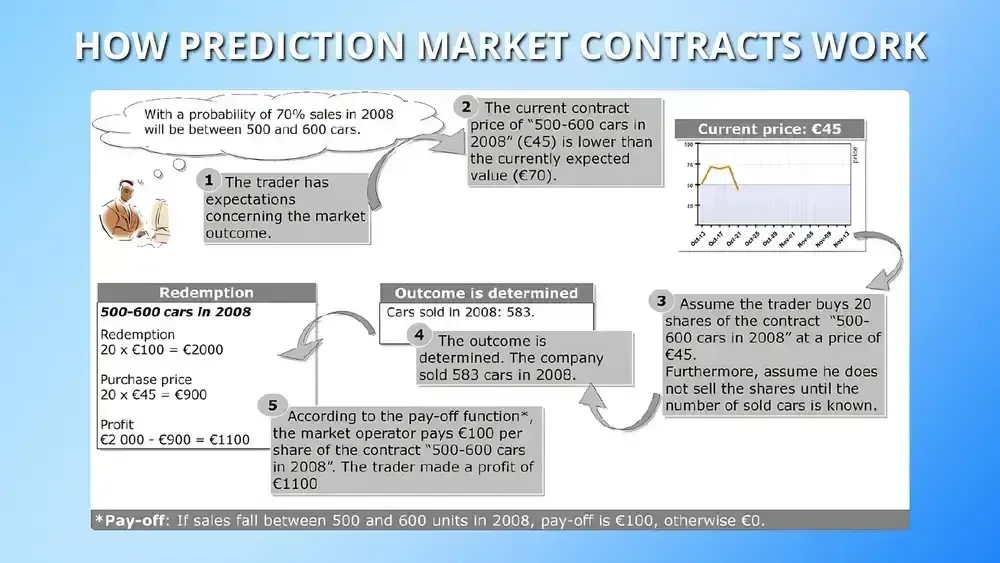
Decentralized Prediction Markets
Decentralized prediction markets operate on blockchain protocols where smart contracts and oracles replace centralized control, making markets transparent, tamper-resistant, and community-driven.
Core components of DeFi prediction markets are:
- Smart contracts: Platforms like Polymarket or BET use blockchain code to manage collateral, execute trades, and process payouts automatically.
- Oracles: Services such as UMA and Chainlink supply verified event data like election results or sports scores to resolve markets without human bias.
- Liquidity mechanisms: Automated market makers and user-supplied collateral keep markets active without relying on centralized market makers.
- Economic incentives: Traders earn from accurate predictions while liquidity providers and token stakers receive fees or rewards for supporting the system.
- Community governance: Token holders vote on market rules and protocol upgrades, ensuring users shape the platform’s evolution.

How Accurate Are Prediction Markets?
Prediction markets consistently rival or outperform traditional polls in forecasting. Research on the Iowa Electronic Markets showed that from 1988 to 2004, markets produced more accurate US presidential election forecasts than leading national polls in 74% of cases.
Their predictive strength extends beyond politics into science and academia. A study of 103 replication experiments found that markets forecast correctly 73% of outcomes, demonstrating their ability to aggregate expert and lay insights effectively.
Accuracy is not guaranteed in every case and depends on liquidity, participant diversity, and clear resolution rules. Still, when designed well and actively traded, prediction markets often provide faster and more reliable signals than polls or expert panels.
Are Prediction Markets Platforms Legal?
Yes, prediction markets are legal in some jurisdictions when operated under recognized regulatory frameworks, but they occupy a complex gray area at the intersection of gambling, finance, and emerging technology.
In the United States, oversight falls under the Commodity Futures Trading Commission (CFTC), which has granted full regulatory approval to platforms like Kalshi. A 2024 federal appeals court ruling further strengthened their position, affirming that CFTC-regulated contracts preempt state gambling laws.
Not all operators have been as fortunate. Polymarket was fined $1.4 million and forced to block US users after a CFTC settlement, while its founder faced an FBI raid as part of an ongoing investigation. These actions highlight the risks of operating outside the regulated framework.
Internationally, rules diverge just as sharply. While some regions classify prediction markets as gambling or financial products, others ban them outright, with France, Singapore, and Thailand blocking access in 2024. The result is a patchwork of regulation that leaves the industry both expanding and under constant scrutiny.
Risks of Prediction Markets
Prediction markets offer powerful forecasting insights, but they also expose participants to financial, technical, and regulatory risks. Below are the key risks that traders and investors should carefully consider:
- Regulatory Uncertainty: Evolving legal frameworks can restrict certain contracts or shut platforms, leaving participants without recourse to recover funds.
- Liquidity Gaps: Low participation can create wide spreads and distort pricing, making it difficult to enter or exit positions efficiently.
- Oracle Failures: Inaccurate or compromised data feeds may misreport event outcomes, resulting in disputes and wrongful settlement of contracts.
- Platform Security: Smart contract bugs or centralized exchange breaches could expose user funds, even when operators advertise strong safeguards.
- Market Manipulation: Large traders may deliberately skew contract prices to influence sentiment, undermining the market’s role as a forecasting tool.
- Ambiguous Resolution: Poorly defined contract terms or unclear event criteria can cause contested outcomes, canceled trades, or delayed payouts.
- Volatility Exposure: Sudden news events can swing probabilities substantially, leaving traders vulnerable to steep losses in very short timeframes.
Even when everything runs smoothly, outsized wins can spark controversy and regulatory heat. In 2024, a French trader made headlines by earning $85 million on Trump’s victory through Polymarket, only to face scrutiny as regulators questioned the platform’s legality and the integrity of such massive wagers.
Final Thoughts
Polymarket demonstrated the strength of decentralized prediction markets during the 2024 US elections, where its forecasts reached millions and outperformed traditional polls.
In 2025, innovation is being dictated by Drift’s BET on Solana and Myriad on Abstract, while centralized platforms like Kalshi, Robinhood, and Crypto.com expand access under formal regulation.
Although speculative activity cooled earlier this year, trading remains steady across macroeconomic contracts and is already building momentum ahead of the 2026 US midterms.
Frequently asked questions
Can Prediction Markets Be Manipulated?
Yes, manipulation is possible, especially in low-liquidity markets where a single large trader can distort probabilities. To counter this, leading platforms use liquidity incentives, oracle safeguards, and transparent order books that make sustained manipulation costly and difficult.
Do Prediction Markets Pay Interest on Funds?
Some decentralized platforms like Drift’s BET allow collateral to earn lending yield while positions remain open. This makes them more capital-efficient than traditional prediction venues, where idle funds generally earn nothing.
What Types of Events Are Typically Excluded?
Most regulated platforms prohibit contracts on sensitive topics such as assassinations, terrorism, or natural disasters due to ethical and legal constraints. Even decentralized markets tend to avoid events that lack clear resolution criteria or carry reputational risk.
How Do Taxes Work for Prediction Market Profits?
In the US, centralized platforms like Kalshi and Robinhood issue 1099 forms for profits that meet IRS reporting thresholds. Decentralized platforms require users to self-report gains as capital income, since no tax forms are automatically generated.

Written by
Tony Kreng
Lead Editor
Tony Kreng, who holds an MBA in Business & Finance, brings over a decade of experience as a financial analyst. At Datawallet, he serves as the lead content editor and fact-checker, dedicated to maintaining the accuracy and trustworthiness of our insights.





.webp)




